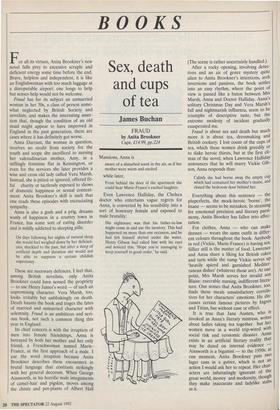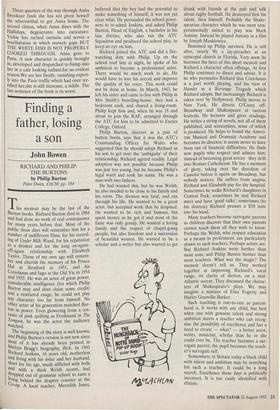BOOKS
Sex, death and cups of tea
James Buchan
FRAUD by Anita Brookner Cape, £14.99, pp.224 For all its virtues, Anita Brookner's new novel falls prey to excessive scruple and deficient energy some time before the end. Brave, helpless and independent, it is like an Englishwoman with too much luggage at a disreputable airport: one longs to help but senses help would not be welcome.
Fraud has for its subject an unmarried woman in her 50s, a class of person some- what neglected by British Society and novelists; and makes the interesting asser- tion that, though the condition of an old maid might appear to have improved in England in the past generation, there are cases where it has definitely got worse.
Anna Durrant, the woman in question, receives no credit from society for the youth and scope she sacrificed to nursing her valetudinarian mother, Amy, in a stiflingly feminine flat in Kensington, or even for the services she later provides a wise and cross old lady called Vera Marsh. Instead, she is pitied or ignored, offered fit- ful charity or tactlessly exposed to shows of domestic happiness or sexual content- ment: Anita Brookner's skill is such that one reads these episodes with excruciating sympathy.
Anna is also a gush and a prig, dreams wanly of happiness in a country town in France, has some sort of eating disorder and is mildly addicted to sleeping pills:
On days following her nights of natural sleep she would feel weighed down by her deficien- cies, shackled to the past, but after a sleep of artificial depth and duration she would not be able to suppress a certain childish expectancy.
These are necessary defences. I feel that, among British novelists, only Anita Brookner could have sensed the propriety — to use Henry James's word — of such an unpromising character. Vera Marsh, too, looks irritably but unblinkingly on death. Death haunts the book and tinges the fates of married and unmarried character with solemnity. Fraud is an ambitious and seri- ous book, not such a common thing this year in England.
Its chief concern is with the irruption of men into female friendships. Anna is betrayed by both her mother and her only friend, a Frenchwoman named Marie- France, at the first approach of a male. I use the word irruption because Anita Brookner describes these encounters in brutal language that contrasts strikingly with her general decorum. When George Ainsworth, in his horrific male integuments of camel-hair and pigskin, moves among the chintz and pot-plants of Albert Hall Mansions, Anna is
aware of a disturbed scent in the air, as if her mother were warm and excited
while later,
From behind the door of the apartment she could hear Marie-France's excited laughter.
Even Lawrence Halliday, the Chelsea doctor who entertains vague regrets for Anna, is converted by his sensibility into a sort of honorary female and exposed to male brutality:
His nightmare was that his father-in-law might come in and use the lavatory. This had happened on more than one occasion, and he had felt himself shrivel under the water. Henry Gibson had raked him with his eyes and noticed this. 'Hope you're managing to keep yourself in good order,' he said.
(The scene is rather uncertainly handled.)
After a rocky opening, involving detec- tives and an air of genre mystery quite alien to Anita Brookner's intentions, arch inversions and passives, the book settles into an easy rhythm, where the point of view is passed like a baton between Mrs Marsh, Anna and Doctor Halliday. Anna's solitary Christmas Day and Vera Marsh's fall and nightmarish influenza, seem to be triumphs of descriptive taste, but the extreme modesty of incident gradually exasperated me. Fraud is about sex and death but much more it is about tea, dressmaking and British cookery. I lost count of the cups of tea, which these women drink greedily or to slake heroic thirsts, but at the first cli- max of the novel, when Lawrence Halliday announces that he will marry Vickie Gib- son, Anna responds thus:
Calmly she had borne away the empty cup which had contained her mother's tisane, and closed the bedroom door behind her.
Everything about this sentence — the pluperfects, the mock-heroic 'borne', the tisane — seems to be mistaken. In straining for emotional precision and literary parsi- mony, Anita Brooker has fallen into affec- tation.
For clothes, Anna — who can make dresses — wears the same outfit in differ- ent colours throughout the book. Anybody in red (Vickie, Marie-France) is having sex. Sillier still is the matter of food. Lawrence and Anna share a liking for British cakes and tarts while the vamp Vickie serves up `heavily spiced and garnished Mediter- ranean dishes' (whatever those are). At one point, Mrs Marsh serves her invalid son Blaise: execrable nursing, indifferent litera- ture. One senses that Anita Brookner, too, finds these meals unsatisfactory correla- tives for her characters' emotions. He dis- cusses certain famous pictures by Ingres and Titian, but without ease or effect. It is true that Jane Austen, who is invoked as Anna's literary mistress, writes about ladies taking tea together but her women move in a world trip-wired with social risk and economic disaster. Anna exists in an artificial literary reality that may be dated on internal evidence — Ainsworth is a bigamist — to the 1950s: at one moment, Anita Brookner puts two lager cans in a gutter, which is not an action I would ask her to repeat. Her char- acters are infuriatingly ignorant of the great world, money and modernity, though they make inaccurate and ladylike stabs at it. Three quarters of the way through Anita Brookner finds she has not given herself the wherewithal to get Anna home. The second climax, when Anna dines with the Hallidays, degenerates into caricature: Vickie has ruched curtains and serves a bouillabaisse in which mussels gape BUT THE WHITE FISH IS NOT PROPERLY COOKED THROUGH. Anna goes to Paris. A new character is quickly brought in, developed and despatched to bump into her in a cafe looking radiant,for no evident reason.We see her finally, vanishing expert- ly into the Paris traffic which had once ter- rified her;she is still tiresome, a riddle. The last sentence of the book is its worst.











































 Previous page
Previous page